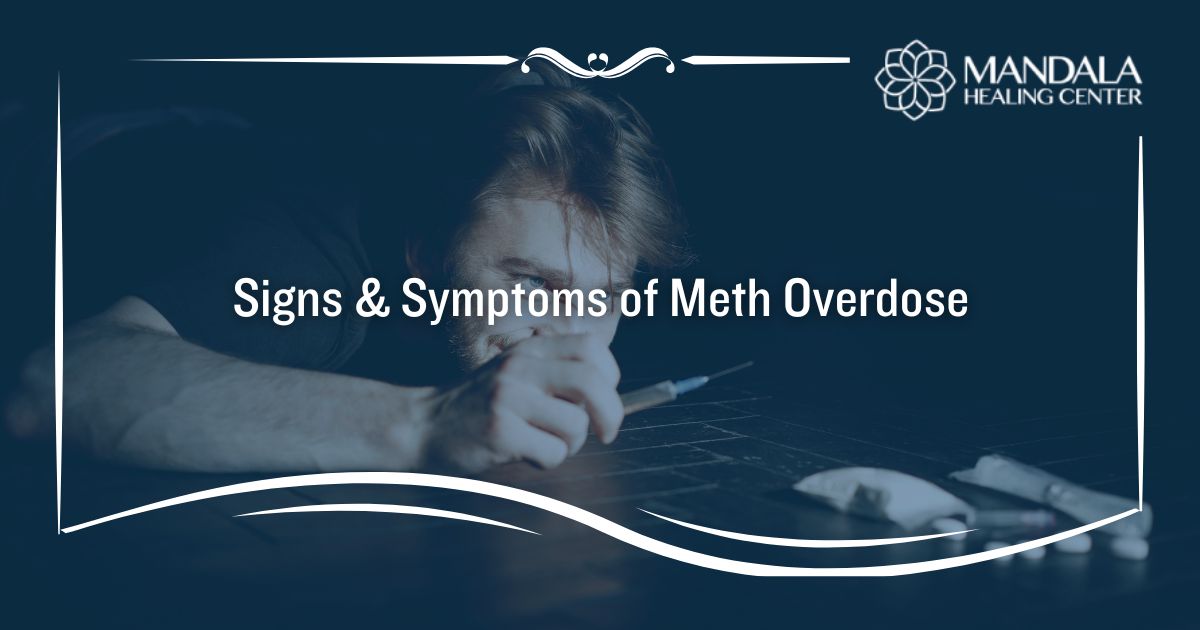Meth is a potent stimulant drug that is used medicinally under the brand name Desoxyn.[1] Doctors prescribe it to treat attention deficit hyperactivity disorder (ADHD) and weight loss. That being said, it is not used frequently because it is habit-forming and addictive.
It is important to note that most people who abuse meth are buying it off of the street. The substance they obtain has dangerous additives and unknown chemicals in it, making it risky to abuse. Illicit meth can cause symptoms like a rush of euphoria and energy, increased heart rate, chest pains, heightened body temperature, and more.
Taking too much can lead to an overdose, resulting in high blood pressure, fast or irregular heartbeat, heart attacks, and more. If you believe someone is overdosing on meth, contact 911 immediately.
Despite the risks, an estimated 2.5 million people in the United States reported abusing meth in 2021.[2]
This article discusses the signs and symptoms of meth overdose. You will learn:
- How is meth abused
- What are the effects of meth
- Signs of a methamphetamine overdose
- How to tell if you are addicted to meth
How Do People Abuse Meth?
Illicit meth usually comes in the form of crystals, so it is also referred to as crystal meth. There are many different ways to abuse meth, including swallowing, snorting, smoking, and injecting.
Some people simply swallow the crystals or put them in an empty capsule to “parachute” them. However, this makes it take longer for the effects to kick in.
It is most common to smoke meth. People heat the crystals in a glass bubble until they become vapor.
Some people crush up the crystals and snort them. This method of administration has one of the fastest onsets of effects.
Lastly, some people begin injecting crystal meth once they develop a tolerance to other methods of administration. The effects start instantaneously and are the most potent this way. That said, intravenous injection is considered the most dangerous method of administration.
What are the Effects of Meth?
Crystal meth is known for causing increased energy, feelings of euphoria, fast heart rate, and mental health issues like paranoia or delusions. The effects vary greatly depending on the dose you use and how long you have been high on it. Binging on meth causes you to experience something known as “tweaking,” which is characterized by insomnia, decreased appetite, and the symptoms of psychosis.
The effects of meth may include:[3]
- Fast heart rate and increased blood pressure
- Heightened body temperature and sweating
- Increased energy and focus
- A rush of euphoria or pleasure
- Feelings of self-confidence or invincibility
- Fast breathing
- Shaking or tremors
- Dilated pupils
- Loss of appetite and decreased need for sleep
- Erratic, aggressive, or violent behavior
- Paranoia and delusions
Signs of a Meth Overdose
As your addiction progresses, you will use larger doses of meth at a time. This means you are at an increased risk of experiencing a life-threatening overdose.
The symptoms of a meth overdose include:[4]
- Agitation or aggression
- Paranoid thoughts and delusions
- Fast heart rate, palpitations, and chest pain
- Trouble breathing
- Elevated temperature and excessive sweating
- Heart attack or cardiac arrest
- Seizures or stroke
Meth overdoses can be fatal. The effects of the drug can place too much strain on your heart, leading to emergencies like heart attacks. If you believe you are experiencing the symptoms of a meth overdose, contact emergency medical services immediately.
How to Tell if You Need Addiction Treatment
Meth can cause significant behavioral, emotional, and physical changes.
The main signs of meth addiction include:
- Having a hard time controlling how much meth you use
- Wanting to quit but being unsuccessful
- Experiencing urges or cravings to abuse meth
- Having trouble meeting responsibilities at home, school, and work
- Losing interest in previously enjoyed activities to have more time to abuse meth
- Using meth in risky situations, such as while driving
- Continuing to abuse meth despite facing relationship or interpersonal issues
- Abusing meth even though it is causing physical or mental health problems
- Having to increase your dose of meth to experience a high
- Dealing with withdrawal symptoms when you stop using meth
Find Help for Meth Abuse and Addiction
If you or a loved one suffers from meth addiction, the Mandala Healing Center is here to help. We offer a combination of medical detox, behavioral therapies, and relapse prevention to allow you to achieve long-term sobriety.
Contact us today for more information on our meth addiction treatment program.
References:
- The Food and Drug Administration (FDA): Desoxyn Label
- The National Institute on Drug Abuse (NIDA): What is the scope of methamphetamine use in the United States
- The Substance Abuse and Mental Health Services Administration (SAMHSA): Know the Risks of Meth
- Medscape: Methamphetamine Toxicity












